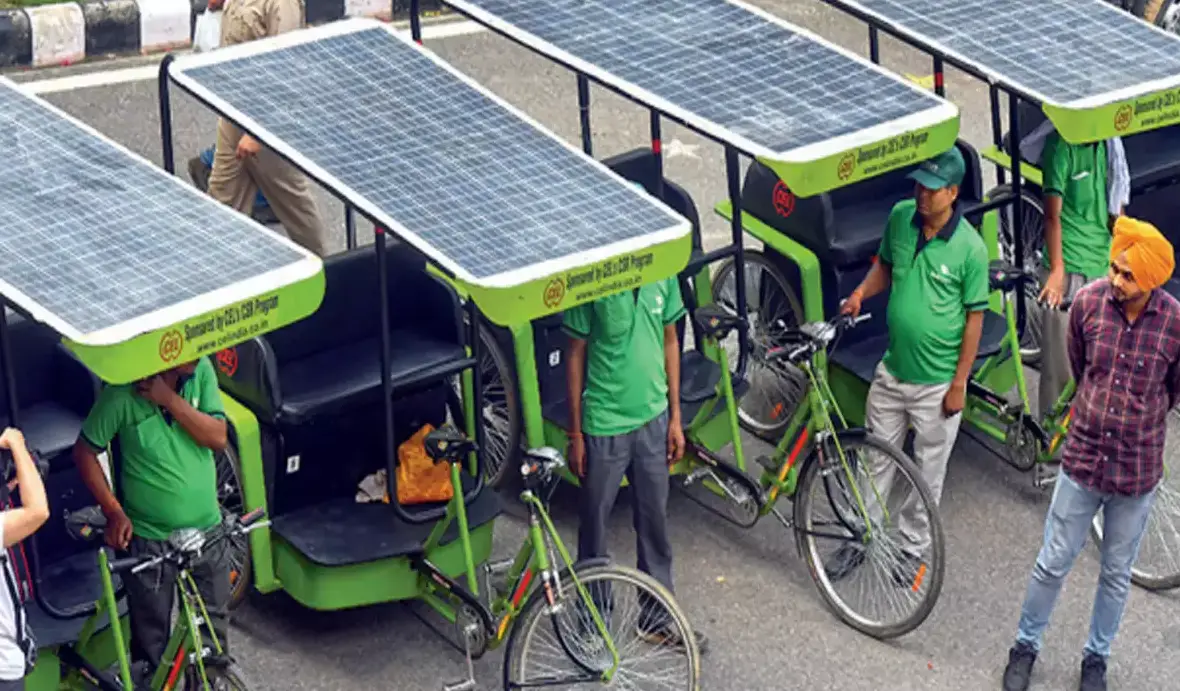Solar Powered Rickshaws Launched At Indian Institue Of Technology
 Courtesy: The Times Of India, IIT Delhi
Courtesy: The Times Of India, IIT Delhi
The use of manual modes of transporting passengers is a blot on humanity. Simultaneously the environment is changing for the worse and our priority should be to lessen our dependence on fossil fuels as much as possible. The solar rickshaw introduced at the IIT-Delhi campus addresses both these issues.
It was the initiative of a central government enterprise, Central Electronics Limited (CEL) that helped the 10 rickshaw-pullers on the campus to switch to hybrid solar-powered rickshaws. These rickshaws can easily alternate between manual and solar modes. The solar rickshaws were manufactured by an NGO- Sukoon Solutions.
Specialized solar panels of 300Watt were fitted to the top of the rickshaws. They were designed and also manufactured by CEL. These panels charge throughout the day and double the distance the rickshaws are driven.
The purpose of making the solar hybrid system was to support the rickshaw pullers during acceleration and heavy rides, thus giving them a respite and leaving them less tired at the end of the day. It has substantially increased their earnings and at the same time reduced the physical demands of continually driving a manual rickshaw. The rickshaw drivers are happy and admit that it has lessened their physical efforts a lot. It can run without manual support for 2 to 4 hours after a full charge while alternating between manual and solar power give the rickshaws a longer running time.
Also read: This Desk-Sized Turbine Can Power A Small Town Using Carbon Dioxide
The switch to solar power has also boosted the use of environment-friendly initiatives to solve local problems. Most often it is the smaller vehicles that consume more fuel per passenger. A train or even a bus is many times more efficient than a car or a two-wheeler when we factor in the number of passengers they carry.
The design of smart solar rickshaws is also a vast improvement over the manual ones. The low seating arrangements are a great help to senior citizens. The lower center of gravity also ensures safety from overturning easily. The braking systems are better fitted than the manual ones. The rickshaws are also fitted with indicators and superior lighting for better night visibility.
It is a rare instance of tradition, technology, and empathy all being part of a single social initiative. Bringing together modern technology and traditional modes of transportation have created a harmonious solution to several issues like the environment, employment, and convenience. We can also expect the students of IIT-Delhi to come up with something more radical, inspired by the rides on the solar rickshaws.
Also read: This Container Makes 2000 Liters Of Water A Day Out Of Air
The ideal speed of the rickshaws is 10-15 km/h, imported motors from China can increase the speed up to 25 km/h. The solar rickshaws also compete favorably with e-rickshaws, driven by electrically charged batteries. The solar ones cost around $950 (Rs.68,000/-) against the e-rickshaws which cost $1740 (Rs.125,000/-).
Over 5000 people have downloaded our free ebook “Growth Hacking Tips And Rituals For Optimal Living” CLICK HERE to get your free copy now
Rickshaws are indispensable on Indian roads, especially the narrow lanes and bylanes. Banning them isn’t the solution and for many families, it is their only source of income. The rickshaw pullers have been driving inside the IIT-Delhi campus since 2002-2003 and the hybrid solar rickshaw has made their life a whole lot easier and continues to remain the final word in eco-friendly, last-mile connectivity.
Leave Comment: